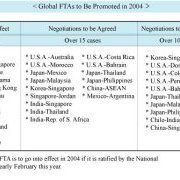29-May-2004
Modern Plastics
The Cancun round of WTO negotiations in Mexico last year ended in disarray, prompting countries to seek other means of freeing up trade.
2-Apr-2004
Over 15 FTAs to be concluded worldwide in 2004
World nations are expected to conclude at least 15 FTAs and to initiate negotiations for more than 10 new FTAs in 2004, the Trade Research Institute (TRI) of Korea International Trade Association (KITA) projected. The TRI also predicted FTA negotiations would be active in American and Asian regions as in 2003.
29-Mar-2004
http://www.manilatimes.net/national...
The option of forging separate bilateral free-trade agreements (FTAs) with various countries could put the Philippines at a tighter disadvantage than it presently is under the World Trade Organization (WTO), government negotiators and economic experts admitted.
24-Mar-2004
Accurate Understanding of FTAs is Essential!
The 5th World Trade Organization (WTO) Ministerial Conference in Cancun, Mexico, ended without consensus, clouding the prospects for the ongoing negotiations over the Doha Development Agenda.





